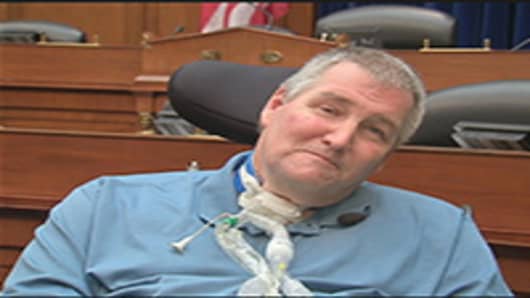It should have been a triumphant moment.
Richard West, a 63-year-old Vietnam veteran who blew the whistle on the largest home health care fraud in history appeared on Capitol Hill in December to tell members of a Congressional subcommittee how he did it, and what they could learn.
“I’m just too stubborn and arrogant to give up,” West told the subcommittee. “But if you’re the average person in my position, you can’t fight.”
Rep. Todd Platts, R-Pennsylvania, chairman of the Subcommittee on Government Organization and Efficiency, hailed West as a true patriot both for his military service and his whistleblowing efforts.
“This isn’t just about money,” Platts said. “This case is about ensuring that we do right by every American citizen.”
As far as West is concerned, that task is not complete.
Six months after helping win a record $150 million settlement for the Justice Department, CNBC has learned West is in danger of losing his health care coverage, and could be on the hook for hundreds of thousands of dollars that the state of New Jersey says he owes.
West, first profiled by CNBC Investigations Inc. in September, has muscular dystrophy. He requires a ventilator to breathe, uses a wheelchair, and needs daily nursing care. In 2003, he qualified for home health care under New Jersey’s Medicaid program.
When nurses were late or failed to show up altogether for their daily appointment, West began to keep records that were instrumental in the government’s case against Maxim Health Services, which was accused of massive overbilling in 41 states. In September, nearly eight years after West first blew the whistle, the Justice Department announced a deferred prosecution agreement with Maxim, which said it took full responsibility for its actions.
But some of Richard West’s troubles were just beginning.
Under federal whistleblower laws, West was entitled to receive a portion of the settlement. He was awarded $15 million, roughly half of which went to pay taxes and legal bills.
Nonetheless, in the eyes of state officials in New Jersey, West is a wealthy man, and the state has moved to terminate his Medicaid benefits. West insists that he cannot qualify for private insurance because of his pre-existing condition. His attorneys argued that under the law, West’s whistleblower payment should not count against his Medicaid eligibility. But the New Jersey Attorney General’s office countered that the settlement was with the federal government and not the state.
“His admitted resources exceed the $2,000 limit for that program,” wrote Deputy Attorney General John Regina in a March 1 court filing.
The state also argues that because it was already reviewing Maxim at the time West blew the whistle, the federal settlement should not be excluded in determining whether West qualifies for Medicaid.
Not only is the state seeking to terminate West’s coverage as a result of the settlement, it is also seeking reimbursement for nearly $900,000 in care West received under Medicaid. New Jersey filed a 359-page lien against his property in December. But West says much of what the state is seeking reimbursement for are services he never received—included in the fraud he exposed.
“In this 359 pages are all the fraud from Maxim,” West wrote in an e-mail to CNBC.
New Jersey Department of Human Services spokeswoman Nicole Brossoie said she could not comment directly on West’s case because it is still in litigation, but noted in an e-mail that West is still covered by Medicaid while his case is pending.
As for West’s inability to get private insurance coverage due to his pre-existing condition, Brossoie noted that individuals with pre-existing conditions who are ineligible for Medicaid can apply for a federally subsidized program known as “NJ Protect.” But West told CNBC the program only covers three days per week of nursing assistance, and he needs daily care.
“I want everyone to know I am not looking for something for nothing,” West wrote in an e-mail to CNBC, noting that he has already paid $1.5 million in federal and state taxes on his settlement.
Meanwhile, West is still receiving accolades. He tells CNBC the New Jersey Council on Developmental Disabilities plans to give him a Lifetime Achievement Advocacy award, and the Maryland Chapter of the Association of Certified Fraud Examiners has notified him it plans to name him “fraud fighter of the year.”
But what he has really been fighting for since 2004 remains elusive.
“I’m getting awards for my eight years, and losing my health care,” he said.
*Additional reporting by Mike Tomaso




